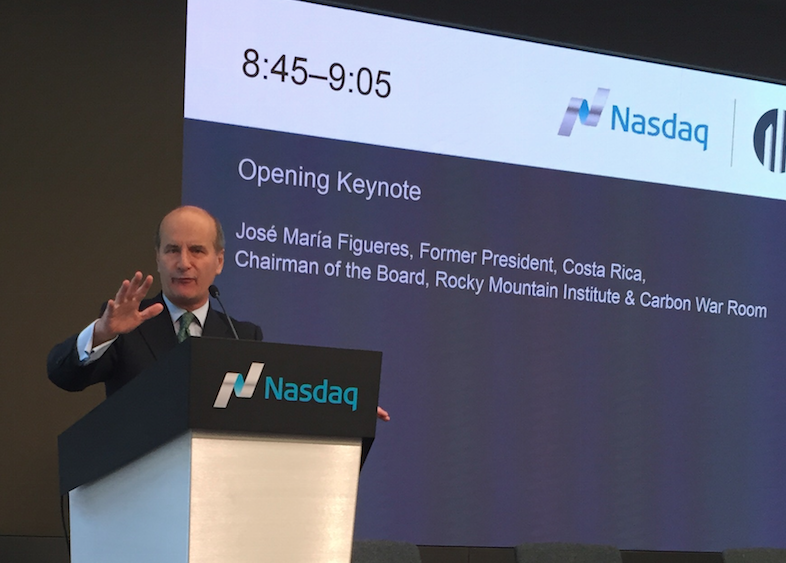Code Green Solutions


On Friday June 19, NASDAQ, the world’s second largest electronic stock exchange hosted an audience hungry for the best. I’m not talking about Fogo de Chao’s ringing of the closing bell after their successful IPO rose nearly 30% in today’s market debut – this group expected much more.
This audience of nearly 200 capital market experts, institutional shareholders, and company professionals descended on NASDAQ for Skytop’s inaugural ESG Summit that included a series of expert panels discussing methodologies for assessing and presenting ESG performance to the capital markets.
NASDAQ’s Director of Corporate Responsibility, Evan Harvey, welcomed the group by highlighting NASDAQ’s 40 year record of efficiency and transparency as the foundation of a brand that drives their current business strategy.
Jose Maria Figueres, the former President of Costa Rica and Chairman of the Board at both RMI and CarbonWarRoom followed by announcing the release of a comprehensive financial study of the REIT market revealing a significant link between portfolio sustainability indicators and REIT stock market outperformance including ROA and ROE measures when adjusted for risk.
CarbonWarRoom commissioned this robust academic research by the University of Cambridge, which used GRESB data to analyze ESG performance metrics by individual REITs and their stock market performance. I encourage you to check it out: The Financial Rewards of Sustainability: A Global Performance Study of Real Estate Investment Trusts.
The CarbonWarRoom report highlights findings including that an increased level of transparency coupled with lower exposure to environmental, energy, and regulatory risk should alter the risk-return profiles of participating REITs over time. This is in line with my personal observations from meetings with REITs who choose to use the GRESB benchmark assessment as a serious internal engagement tool for management introspection, business planning and priority setting, and ongoing implementation of industry best practices.
The bottom line is REITs with higher GRESB ratings could be expected to achieve higher financial return metrics per unit of risk — interesting stuff. With GRESB on track to welcome a strong group of 2015 benchmark participants, there are additional opportunities to assess financial return measures based on 1) longevity of GRESB engagement, 2) year-over-year improvements, and 3) a breakdown of performance on specific Aspects.
The University of Cambridge study is just the latest in a long line of solid evidence reflecting the business case of engaging ESG-based best practices. Comments from research analysts at State Street Global, Morningstar and Moody’s at today’s Summit reinforced how ESG is quietly penetrating company analysis. My overall takeaway from today’s event is that I’m highly confident similar evidence will continue to surface.
In the meantime, dont let out the secret that well-managed REITs with high ESG engagement show market outperformance. Financial markets can be hyper-efficient and I would hate for some mega hedge fund to seize a market opportunity!